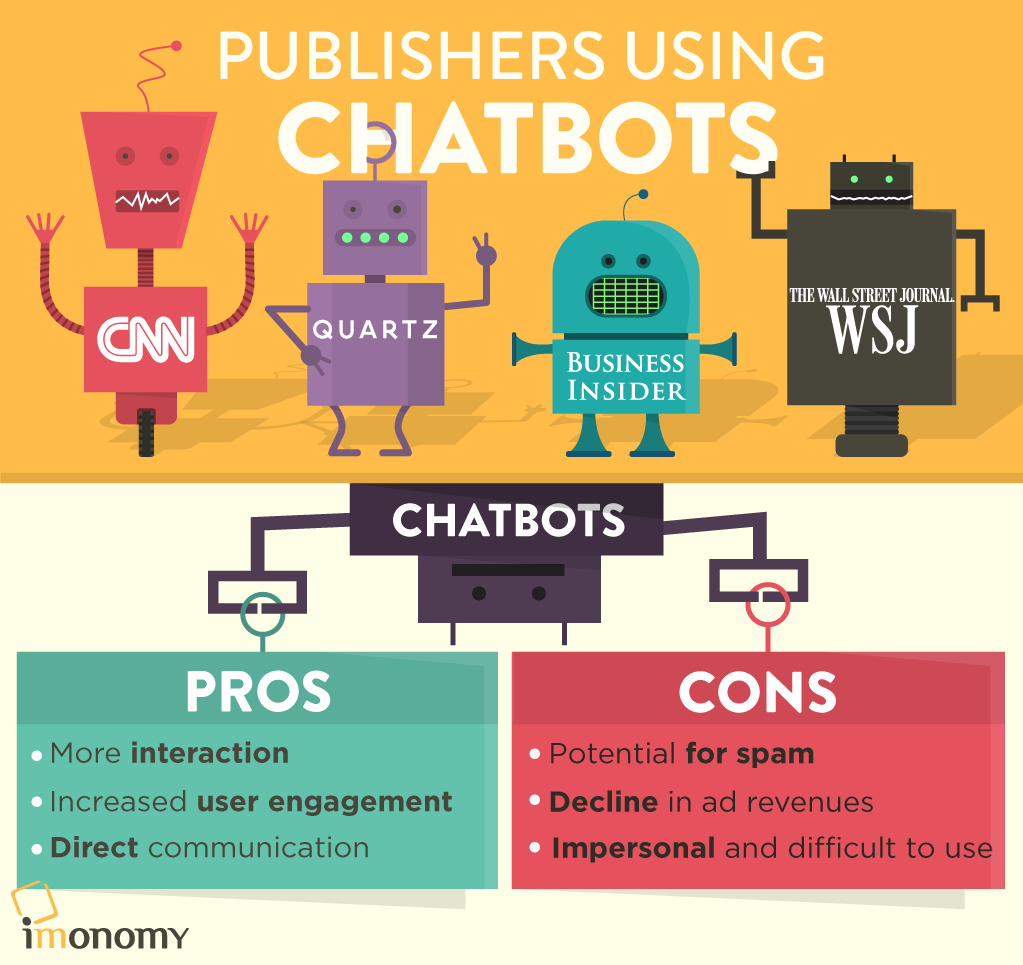What if you could directly message a news site using chatbots asking to see all of the most recent articles about Donald Trump? Or, even better, ask the site to avoid showing you any articles about Donald Trump altogether? Quartz, a digital business publication, recently developed a chatbot that has made this possible and more.
Automated customer support, interactive content, and site guidance are just the beginning of what chatbots will be able to do. Facebook sees a big future in it and introduced chatbots to its Messenger platform in April. The platform has already been adapted by major publishers such as CNN and The Wall Street Journal. Still, many publishers are choosing to wait before jumping on the chatbot boat.
On one end, chatbots offer a great opportunity to engage readers. On the other, they could mean a lot of lost advertising revenue for publishers. In this article, I will discuss both sides of the issue and help answer the question: Should publishers use chatbots now?
Yes, chatbots are great for user engagement
Chatbots, in theory, help to engage users by adding a quasi-human interaction to the user experience. By leveraging smart, autonomous systems, chatbots strive to fake human interaction, sometimes convincingly, but more often, not.
The ability to speak directly with a publisher can help users tailor their reading experience and give them a quick outlet for any support issues. If chatbots work as they are supposed to, users should have a more efficient and relevant reading experience. Unfortunately, they are still at a very early stage, which is why there have been some spectacular failures such as Tay, Microsoft’s artificially intelligent bot, turning into a holocaust-denying racist.
CNN was an early adopter of Facebook’s chatbot Messenger platform and their bot can do some pretty cool things. For example, subscribers to the chatbot can receive a daily digest of top CNN stories, which will be tailored each day as the bot learns the reader’s preferences. In addition, users can message the bot to receive information about specific topics. Examples of messages can include anything from “Who won last night’s primary?” to “What’s the latest in Australia?”
Although, it is important to keep in mind, most bots on the market do not work as well as CNN’s, and to a large degree, offer users a mediocre experience at best. Bots are at an early stage and many users find them to be impersonal, irrelevant, and difficult to use.
Yet, publishers that fail to adapt to the chatbot trend may one day find themselves left behind. An article entitled Will Intelligent Personal Assistants Replace Websites? on Moz.com puts it best:
If your long-term marketing/business plan doesn’t account for Intelligent Personal Assistants, you may be in the same boat as those people who said they didn’t need a website in the early 2000s.
No, chatbots might mean a sharp decline in ad revenues
The scary question publishers must ask themselves is: Will chatbots mean the end of ad revenues or will they simply offer an additional channel for monetization?
It may be too early to tell, but there seems to be no real chatbot monetization solution in sight. Messaging users a banner ad would destroy the personal relationship chatbot-use is dependent on, as well as impede on the user experience.
Publishers and advertisers will need to be very creative in order to find ways to generate additional revenue through chatbots. If they fail, it could mean a huge shift in how publishers make money and most likely, a steep decline in revenues.

Are there better options?
Using chatbots may become inevitable for publishers as more and more adapt. However, to keep ad revenues steady publishers will need to focus on using chatbots as a tool to get users to their sites.
Moreover, if publishers rush to adopt bots without finding a sustainable monetization solution, they will needlessly sacrifice the benefits they already enjoy from using more effective, next-generation advertising solutions such as in-image advertising and native advertising, more generally.
In-image advertising, in particular, offers an innovative monetization solution that displays advertisements on the most engaging parts of any site, the images. Users enjoy an improved ad experience, while advertisers benefit from higher viewability and increased engagement rates, leading to higher CTRs.
Native advertising is still very much a growing advertising platform that is showing remarkable results. As we pointed out in our article titled “Native Advertising Could Succeed As Display Ads Falter” –
Native advertising is rapidly becoming an attractive ad choice for publishers as display advertising becomes less effective in the face of growing ad blocker adoption.
Chatbots may have a profitable future for publishers but, for the time being, publishers shouldn’t lose sight of the effective site monetization options that are earning revenue for them right now.
What’s the bottom line?
As chatbots gain wider-use in the publishing industry, it’s important for publishers to think about if, when, and how to adapt chatbots without changing their business models. Publishers should consider their options before jumping headfirst into a technology that may lead their ad revenues to walk out the door.
A few questions publishers should be asking: Is increased engagement worth the risk of decreased ad revenues? Is there a way to tailor bots to drive traffic to publishers’ sites? And,can publishers advertise using chatbots without losing their readers’ trust?


Are there free chatbots plugins for joomla websites
Good question. I don’t know, unfortunately. I suspect chatbots will remain platform specific for the time being and any interoperability will likely be through APIs the likes of Facebook may publish when the technology matures more.